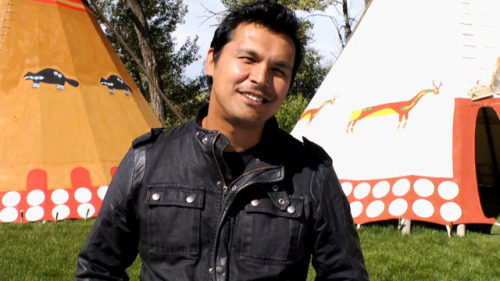fyeahindigenousfashion:Indigenous Style Icon of the Week: Adam Beach (Saulteaux)Adam Beach was raise
fyeahindigenousfashion:Indigenous Style Icon of the Week: Adam Beach (Saulteaux)Adam Beach was raised on the Dog Creek First Nations Reserve with his two brothers. A troubled childhood saw his mother killed by a drunk driver, and his alcoholic father drowned only weeks afterward. The three brothers went to live with their grandmother and then with their uncle and aunt in Winnipeg, where Adam joined drama classes and began acting in local theatre productions. Says Beach, “Acting has made me embrace my childhood. It’s become some weird form of therapy. It’s like I have a place where I can release all of these emotions.”Since then he has appeared in over 60 films and television programs. His performance in the Academy Award-nominated Clint Eastwood-directed Flags of Our Fathers (2006) was phenomenal. He played Ira Hayes, a Pima Native American who was one of the six US Marines to raise the American flag on Iwo Jima and who found the resulting fame hard to handle, subsequently giving way to alcoholism. This alone would have been an emotional role for Adam to play; however, during filming, both his grandmother and best friend passed away. His role as Hayes is both realistic and heartbreaking, earning him two Best Supporting Actor Award Nominations. He stands out well above the rest of the cast.Adam has been further nominated for three Awards for his role in Bury My Heart at Wounded Knee, including a Golden Globe. Other notable TV appearances include Walker Texas Ranger, Law & Order: SVU, Big Love, & Arctic Air. He has also starred in several well-known feature films: Dance Me Outside, Smoke Signals, Joe Dirt, Windtalkers, Four Brothers, and Cowboys & Aliens. His debut role in Dance Me Outside earned him the Best Actor award at the American Indian Film Festival. Adam hopes to be appointed leader of his Lake Manitoba First Nation, and is a strong community member and anti-racism activist. In an interview with Time Magazine, Beach said, “Look at the history of Native American people in Hollywood: they have not been represented in a human way on film…When I was growing up, my white friends would call me: “Hey, Chief!” Even when I go to work now, people call me “Chief.“ People think they have the right to use that term with an Indian person…It’s how people acknowledge Indians. Hollywood has portrayed such a negative image of who we are as people up on screen. They don’t realize that there is a culture. There’s another part of us that exists…I do acknowledge my status as a role model for Native American people. I carry it on my sleeve. I do want a younger generation to look at me and say, “Wow, what did he do to achieve such status in Hollywood?” I want Native children to have success within their hopes and dreams.“ -- source link
Tumblr Blog : fyeahindigenousfashion.tumblr.com






